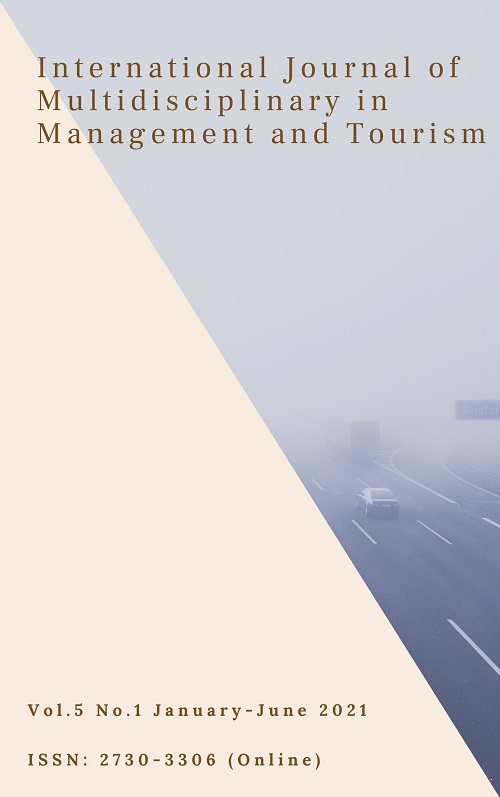The impact of Employee Training on Huawei innovation Performance in Shanxi Province, China
Main Article Content
Abstract
This paper finds the innovation gap and Huawei is a private enterprise with employees holding equity, and employees are the source of sustained vitality and driving force for Huawei's development and innovation. Therefore, this paper starts from employee training. Employee training has become one of the most important links for Huawei to achieve effective innovation. As the terminal department, Huawei authorized the experience stores(HAES), whose employees can more truly understand customers' needs. China's first Huawei 5G smart experience store has opened in Shanxi Province.
The purpose was to research the impact of employee training on Huawei innovation performance in Shanxi Province, China; and to analyse validity, reliability, correlation analysis linear regression. The population is 9478 employees in HAES in Shanxi Province, including all technical research and development, product production, sales, service and a series of related employees. This paper adopted mix methods with in-depth interview and questionnaire survey, and SPSSAU is used for data analysis. The analysis results show that there is a positive impact between employee training on Huawei innovation performance. The conclusion is that they become the most important part of employee training and need to be constantly updated, including collaborative innovation culture and atmosphere, innovative service concept, innovation promotion and innovation service incentive mechanism, employees' enthusiasm, initiative and creativity, the promotion of brand culture, feedback Mechanism, etc.
Article Details

This work is licensed under a Creative Commons Attribution-NonCommercial-NoDerivatives 4.0 International License.
References
Baldwin, T. T. & Ford, J K. (1988). Transfer of Training: A Review-and Directions for future Research. Personnel Psychology, 41, 63-105.
Feirong, W. & Yanjun, F. (2013). An empirical study on the relationship between organzational culture and technological innovation performance based on organizational learning. R & D Management, 25(01), 36-43.
Guoxin, L. & Zhou Si. (2015). Research on the Influence of knowledge management on technological Innovation performance of enterprises. Modern Business, 3, 140-142.
Jianfeng, Y, Zhongming, W, Jiagui, L. (2010). The Mechanism Used by Organizational Learning to Influence Organizational Performance. Science of Science and Management of S & T, 7, 158-162.
Jinfeng, W., Ruiqiang, W., Lijie, F. & Junju, Y. (2017). Mechanism Study on Innovative Climate,Staff Innovation Willingness and Innovative Performance Empirical Analysis of High-tech Enterprises. Research on Economics and Management, 9, 36-39.
Noe, R. A., & Wilk, S. L. (1993). Investigation of the factors that influence employee’s participation in development activities. Journal of Applied Psychology, 78(2), 291-302.
Noe, R. A. (1986). Trainees Attributes Neglected on Training Effectiveness. Academy of Management Review, 4(7), 36-749.
Oana-Maria,F. et al. (2017). Zooming Innovation in Consumer Electronics International Conference (ZINC) - The TRAVEE neuromotor rehabilitation system: In-vivo testing, 2017, 30-33.
Qin, L. (2017). Research on the influence of total quality management and technology innovation on enterprise performance with staff training as the main content. Modernization of Education, 32,36-39.
Rouiller, J. Z., Goldstein, I. L. (1993). The relationship between organizational transfer climate and positive transfer of training. Human Resource Development Quarterly, 4,377-390.
Tharenou, R, Latimer, S. & Conroy, D. (1994). How to make it to the top: An Examination of Influences on Women and Men Managerial Advancement. Academy of Management Journal, 32, 402-423.
Tracey, J. B.(1995). Applying trained skills on the job: The importance of the work environment. Journal of Applied Psychology, 80, 239-252.
Xiaolei, Q., Dongtao, Y. & Jiangru, W. (2007). An Empirical Study on the Relationship between Innovation Strategy, Employee Training and Enterprise Performance in Manufacturing Enterprises. Journal of Management, 03, 354-357.
Yuandong, G. & Jisheng, P. (2010). The Effect of Organizational Creative Climate on Employees' Creative Behavior: The Moderating Effect of Creative Self-efficacy. Nankai Business Review, 13(1), 30-41.

